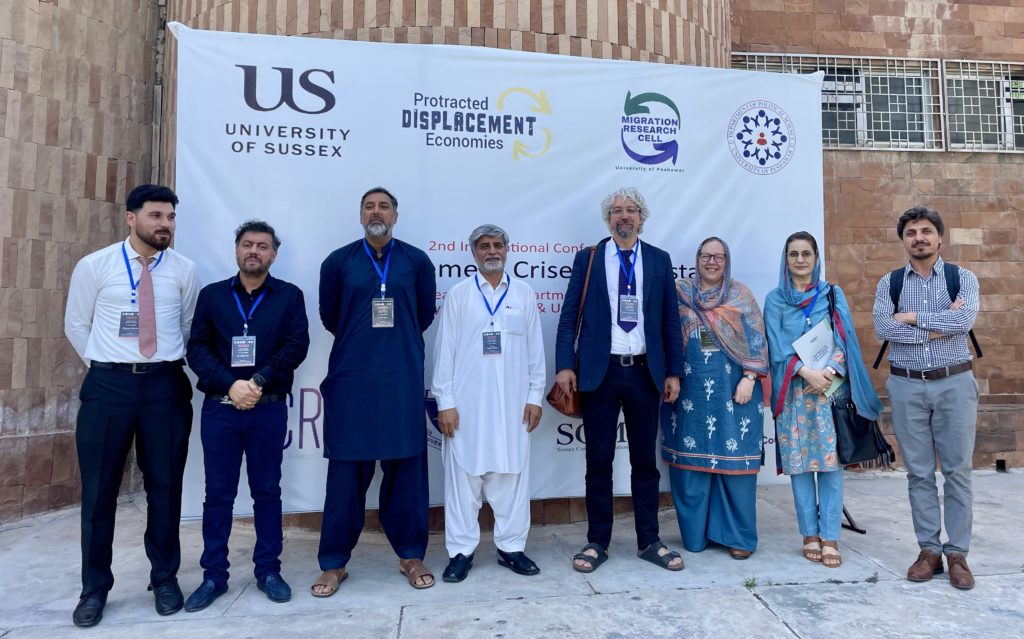A collaborative blogpost by Dr Ayub Jan and Professor Shahida Aman of the University of Peshawar, Pakistan, with Dr Ceri Oeppen, Dr Tahir Zaman and Professor Michael Collyer of SCMR.
One of the largest protracted displacement populations in the world; significant internal and international labour migration; historic displacement from partition; forced migration due to floods and other climate-related hazards… These are just some of the reasons why Pakistan is such an important location for migration research.
SCMR co-directors Ceri Oeppen and Tahir Zaman, and SCMR member Mike Collyer, recently returned from a visit to Pakistan where they spent time with PDE Project co-investigators at the University of Peshawar, the oldest university in Khyber Pakhtunkhwa (north-west Pakistan). Their visit included an international conference, Displacement Crises in Pakistan, and the launch of the newly established ‘Migration Research Cell’. Based in the Department of Political Science, the Migration Research Cell is a stepping stone to a full Migration Research Centre at the University of Peshawar.

The SCMR team spoke to Dr Ayub Jan, Director of the Migration Research Cell, about the importance of migration studies in Pakistan, and his and Professor Shahida Aman’s (Chairperson of the Department of Political Science’s) plans for future migration research.
Thanks so much for hosting our visit to Pakistan, it’s so exciting to see all the migration studies activities you’re working on! Why do you think it’s important to research migration in Khyber Pakhtunkhwa?
We at the Department of Political Science have created a Migration Research Cell, which is the first of its kind in the Khyber Pakhtunkhwa province. The reason why we feel it is important to research migration in the province is that Khyber Pakhtunkhwa is home to more than four million registered and unregistered Afghan refugees. The issue of displacement is a protracted one as Pakistan generally and Khyber Pakhtunkhwa specifically has been home to Afghan refugees for four decades and more. More than 70 % of the Afghan refugees in Pakistan live in Khyber Pakhtunkhwa. These protracted refugee crises have led to the growth of ‘Protracted Displacement Communities,’ where the hosts and refugees are now intertwined in economic and socio-cultural links of mutual support and friendships. This is besides the millions of internally displaced people who have also suffered forced displacements because of the war and conflict in the borderland and the climatic disasters that have struck the province quite severely in the last few years. We feel that such aspects of protracted displacement crises are quite under-researched and therefore need to be academically and rigorously investigated.
How will your migration research work feed into your teaching in the Department of Political Science?
We have been thinking of incorporating migration- related courses since the start of our migration research projects. Recently, we succeeded in getting approval from the Board of Studies in Political Science at the University of Peshawar to start teaching a mandatory course on Migration Studies at the undergraduate level. We have also included five new specialized courses on Migration at the MPhil and PhD. level, mostly drawing from our diverse research work undertaken over the last three years, much of it with our SCMR colleagues. The draft has already been shared with the University’s relevant academic bodies for approval. The Fall 2024 session will open with these new courses taught at the BS and MPhil/ PhD., levels.
What do you think are the key issues for migration researchers in Pakistan?
The key issues for migration researchers are manifold:
- Conflict areas are difficult to access, especially the borderland areas where the security situation is still precarious.
- There is a plethora of government organizations, whose NOC (No Objection Certificate) are a must for carrying out research in conflict and camp settings and among refugees. So, this entails going through several official channels and planning beforehand.
- It can be a challenge to gain the trust of the refugee and displaced communities for conducting interviews among them. For this, it is important to first gain the trust of the intermediaries, especially the local leaders called maliks, shura members or masharan (elders).
- Cultural sensitivities around women mean that only men can collect data from men and women can collect data from women. Also, accessing women and allowing them to express themselves freely often become challenging because of their restricted mobility and patriarchal norms regulating the lives of women migrants.
- Another issue is the availability of statistical data related to refugees living in Pakistan. Particularly, Afghans who live as registered and unregistered refugees in diverse settings of camps and cities. In bigger camps such as the Pannia camp in Haripur, despite being closely regulated, multiple data are produced by authorities, community mobilizers, and community leaders (maliks) about the number of households and individuals living in the camp. This creates a problem of selecting samples for researchers.
What are your plans for the Migration Research Cell at the University of Peshawar?
We are planning to turn the Migration Research Cell into a full-fledged Migration Research Centre with the capacity to enrol students in different programmes at the Undergraduate, MPhil and PhD., levels and give specialized degrees in Migration Studies. We also plan to link the Migration Research Cell with migration centres around the world including the Sussex Centre for Migration Research. We hope to undertake various further collaborative academic exercises under a Memorandum of Understanding (MoU) with the University of Sussex. This includes the exchange of faculty and students as well as academic collaboration through joint research projects, organizing conferences and summer schools, and developing courses on migration studies.
Epilogue
SCMR Co-Directors are currently working with Dr Jan and Professor Aman to propose a Memorandum of Understanding between the University of Sussex and the University of Peshawar to facilitate future collaborative research and teaching – Watch This Space!


Leave a Reply